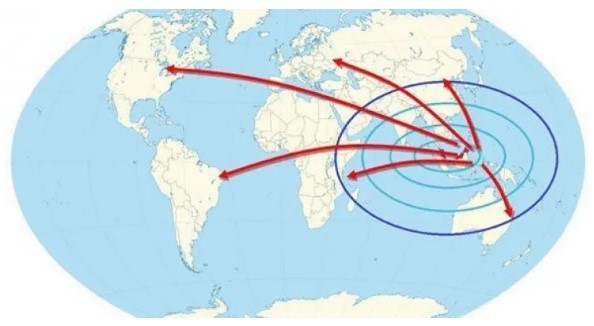Internationalisation At Stake, Globally. Time To Walk The Talk, Delivering On The Promises!
Emeritus Professor Tan Sri Dato' Dzulkifli Abdul Razak
Opinion - Bacalah Malaysia
May 27, 2024

The recent media report that Malaysia’s higher education sector is attracting global interest, especially from Central Asia comes as no surprise.

"In fact, it is to be expected because Malaysia has been ‘internationalising’ itself as an education hub ever since.
At one time, the international exchanges and collaboration used to be more vibrant and smoother not too long ago when it was more decentralised and flexible at the level of the institution and the agency concerned, namely the related Immigration Department.
The mutual trust and reciprocity nurtured between them made the transactions very cordial and friendly. Internationalisation translates into an efficient and effective experience for students the world over, especially from developing nations.

The influx of international students was at its height providing affordable, quality education in a variety of disciplines and locations. However, this is not the case anymore.
Increasingly, internationalisation has morphed into a more revenue-based activity rather than an intellectual one! More about economics than knowledge and wisdom per se.
"In situations where financial sustainability is problematic the issue gets magnified. Hence, the target is confined to the best and the brightest (variously defined), whereas it is the lesser ones that should be prioritised for help and support to achieve academic excellence and equity.
Fuelled by the dubious promotion by the ranking game, education is currently skewed from the original ethos and higher purpose. Simultaneously, the notion of internationalisation has also changed by leaps and bounds.
Beginning from a mere idea of mobility of students outbound during the early years – already then it is asymmetric from the Global South to North. Not the reverse.
When it was later, in 1973, redefined in terms of intercultural exchange and understanding beyond the conventional industrial-human capital approach the the North to South mobility started to move.
"Otherwise, less the humanitarian values and dignity across humanity. The emphasis may somewhat changed, but still subjected to the “colonised” Eurocentric knowledge under the disguise of world-class league tables.
Meaning, it is a western construct which the pandemic exposures through and through such that even the so-called world-class institutions suffered in the same way academically speaking.
In fact, worse off socio-culturally. Namely, through the lockdowns, social isolation and physical distancing. At the same time, the threat of mental health and socio-emotional incursions loomed far and wide regardless.
"All were affected in one way or another, particularly the most vulnerable among those deprived of values-based life-styles and education, which in our case, is the full implementation action of Falsafah Pendidikan Kebangsaan (FPK), 1996.
The pandemic also refocused on the importance of Education for Sustainable Development (ESD) that was overshadowed by another imposing economic agenda, viz; the Fourth Industrial Revolution (4IR), instead of the United Nation framework on Sustainable Development Goals (SDG, 2016-2030), or Agenda 2030.

Compared to the latter, 4IR stole the show academically. Some officials even associate it with Education 4.0 giving the impression that it is a singular “novel” paradigm shift, ignoring that there has never been an Education 3.0, indeed 2.0 or 1.0 to start of with.
In terms of internationalisation, this creates chaos to say the least for Malaysia to be a hub.
"Certainly not as a hub for IR ventures or SDG 2030 since most Malaysian universities are still not familiar with the demands to transform it towards Education for a Sustainable Future through the ESD framework. No doubt, sustainability is key to the next concept of internationalisation within the matrix of global warming and climate crisis. Without which internationalisation falls short as a developmental tool, if not it is meaningless.
This can be detected from the current tragic polemics around the use of the so-called term “apartheid academy” that can jeopardise the formation of an internationalisation hub that Malaysia is aiming for.
Introduced by a supposed seasoned columnist seemingly against Malaysia’s largest public university that caters for a myriad of indigenous as well as international students, it throws opened the Pandora box, rightly or wrongly, creating much mistrust, if not confusion among fellow Malaysians.
At the time of writing, there are a lot of accusations and counter-accusations raging with no noticeable attempt on the part of the Ministry of Higher Education to mitigate the politically charged debate to benefit some interest groups.
"Aptly, the ministry could play the role of arbitrator in putting the issue into perspective within the Malaysian context. Hence, preserving academic integrity befitting internationalisation as a hallmark of autonomy and institutional freedom that have been eroded the world over including the democratic world-class universities.
As late as last week in the many graduation sessions across the US campuses, this is well demonstrated to the world shamelessly.
For Malaysia, its declining position according to the World Press Freedom Index – losing 34 position from 73th last year to 107th this year call for a serious concern where internationalisation is stigmatised as a form of “indoctrination” (read: over-governance) as experienced by many campuses today.

Interestingly, in September 2023, before the October 7 edu-cide on-going campaign, the Foundation for Individual Rights and Expression (FIRE) and College Pulse in their annual ranking on campus free speech, put Harvard University as the only institution to have received an “Abysmal” speech climate rating.
More than half (53 per cent) of students reported self-censoring on campus at least once or twice a month.
While student sanctions are said to be relatively common across higher education and are a leading reason for faculty to self-censor, Harvard’s low ranking can also be attributed to administrators’ lack of support for free speech.
Welcome to the “new” internationalisation! – BACALAHMALAYSIA.MY
- The writer is Rector, International Islamic University Malaysia (IIUM)
